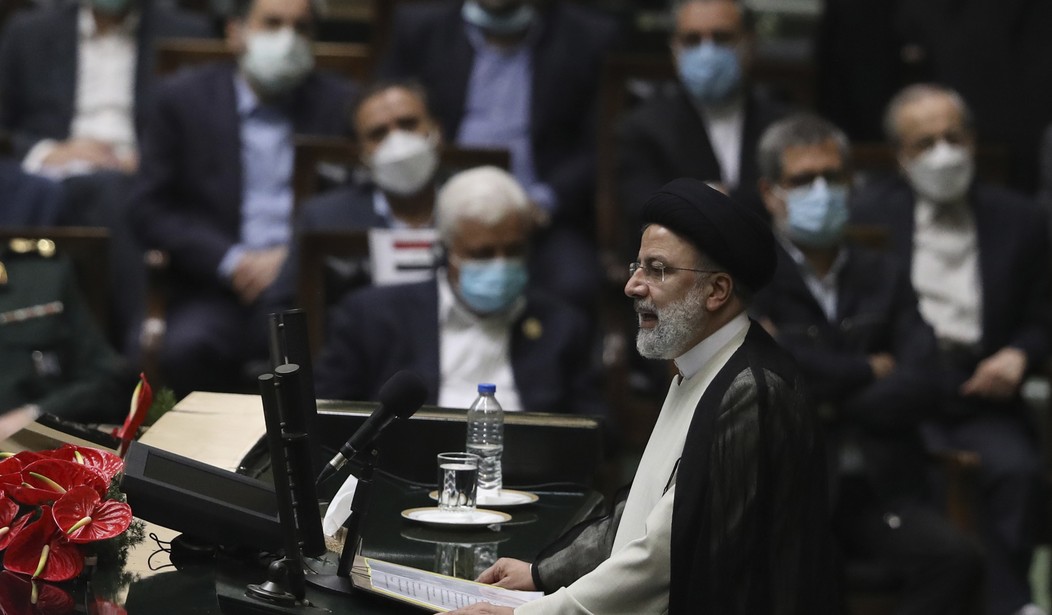In response to a series of major strides made by the largest Iranian opposition, the National Council of Resistance of Iran, the theocratic regime has resorted to "legal action" against it. The regime has put 104 MEK members on notice to appear before a "court" in Tehran, offering a one-month deadline for them to introduce their legal counsel for the trial. So, a regime notorious for carrying out the most executions per capita, along with other monstrous human rights abuses, is desperate to score a propaganda victory.
In 1988, then-Supreme Leader Khomeini issued a fatwa in which he called for the execution of every single MEK member. But the regime ultimately failed to annihilate the MEK, which has continued to increase its political influence in Iran and around the world.
One of the perpetrators of the 1988 massacre is Iran's current president, Ebrahim Raisi, who at the time served as the deputy prosecutor in Tehran. Today, he is orchestrating yet another "trial" targeting MEK members, marking them as an existential threat to the theocratic regime. The international community's hesitancy in holding the Iranian officials accountable for the 1988 massacre, coupled with a lamentable pattern of appeasement, has emboldened Raisi to expand his repressive measures, even onto Western soil.
Despite the abundance of compelling evidence, no significant actions have been taken to investigate or seek justice for the 1988 massacre’s victims and their families.
The former President of the United Nations Human Rights Council, Joachim Rücker, recently urged the UN and the international community to establish an investigatory commission to probe the heinous events of 1988. That appeal has been echoed by a number of Western lawmakers and former world leaders, and was a major focus of a recent resolution introduced to the United States House of Representatives.
The resolution “calls on the United Nations Human Rights Council to include the massacre of thousands of political prisoners in 1988 in the agenda of the fact-finding commission for an independent investigation launched on November 24, 2022, to investigate the ongoing deadly violence against protesters,” namely those who have participated in the nationwide, anti-government uprising that was sparked last September by Mahsa Amini’s death at the hands of “morality police.”
Recommended
Tragically, that violence has only been emboldened by the West's pre-existing policy of appeasement. Furthermore, Tehran's embattled leaders have sought to constrain the MEK's activities beyond Iran's borders, prompting an alarming expansion of human rights abuses into European soil.
In a display of sheer desperation, in June, Raisi sought to manipulate the French government into banning an MEK rally in Paris. Although the French government initially complied with the request, the MEK's resilience and commitment to their cause prevailed as they challenged the decision in court, ultimately winning the right to hold a significant rally attended by thousands of Iranians and hundreds of high-ranking international figures and parliamentarians.
Concurrently, the Albanian government's capitulation to the regime's pressure led to a police raid on the MEK's headquarters near Tirana, accompanied by the unfortunate loss of one resident’s life and the injury of hundreds. This response, touted by the regime as a "diplomatic triumph," demonstrates the perilous consequences of yielding to the regime's demands.
Raisi's determination to pursue "trials" targeting MEK members within Iran reflects an ominous intention to replicate the horrors of the 1988 massacre. The regime's campaign of harassment, arrests, and dubious trials of MEK supporters aims to foster an atmosphere of fear and intimidation. Such measures blatantly attempt to suppress the burgeoning social appeal of the MEK, especially among the youth, as expressed in the messages of over 10,000 Resistance Units during this summer’s Free Iran World Summit in France.
The regime's senior leaders have attributed the recent nationwide protests to the influence of the MEK and its expanding network of Resistance Units. These uprisings, commencing in September 2022, have considerably destabilized the theocracy, placing it at its weakest point in history. In recognition of this fragility, the regime now seeks to exploit Western appeasement as a means to eradicate the MEK, thereby eliminating the most viable alternative to its authoritarian rule.
The regime's initial intent to annihilate the MEK 35 years ago proved fruitless. At its present state of vulnerability, it endeavors to leverage Western complacency to achieve this nefarious objective. It is incumbent upon the international community to desist from extending a lifeline to a genocidal regime and, instead, embrace a resolute stance.
Western governments must pursue a policy that aligns with the fervent aspirations of the Iranian people for a just, secular, and democratic republic that respects the inherent dignity of human rights. The moment demands not only the end of appeasement but also the assertion of accountability for past atrocities. It also demands that Western governments, in accordance with the recent resolution in Washington, “ensure the full protection of the Iranian political refugees in Ashraf 3 in Albania.”
As Robert Menendez, chairman of the US Senate’s Foreign Relations Committee separately emphasized, such safeguards are important because MEK members were granted refuge in Albania and, “if you seek refuge, you ultimately have to be in a position to know that refuge is secure.”
Only through such principled action can we endeavor to ensure that history does not tragically repeat itself, while providing the people of Iran the prospect of a future founded upon the cherished values of justice, democracy, and human rights.

























Join the conversation as a VIP Member